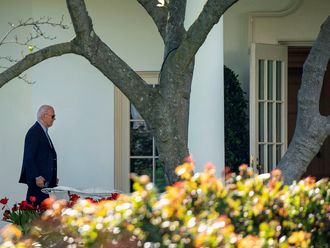COACHELLA: For the past three decades, Emilio Lopez Bautista has risen before dawn and headed to work in the farm fields of California, earning an honest living, buying a house, and steering clear of trouble.
But today, the 66-year-old, who entered the United States illegally from Mexico 30 years ago with his wife and six children, says nothing feels safe or predictable anymore.
Lopez Bautista lives in constant fear that he or a relative could fall victim to President Donald Trump's immigration crackdown.
"We are afraid when we step out of the house at five in the morning to go work in the fields, we are afraid while driving, we are afraid at work and we are afraid at home," said Lopez Bautista, who lives in the Coachella Valley, a rich agricultural region in southern California that is home to tens of thousands of undocumented immigrants employed as farm laborers.
He said since Trump's immigration policies were unveiled on Tuesday, anxiety has spread like wildfire among community members.
"I am very sad and there are days when I can't sleep," said his wife Prudencia.
"What will happen to our grandchildren if we or their parents are arrested? Who will care for them?"
Lopez Bautista said the family was now being more careful with spending in case they are deported, and the couple tries to remain calm in front of their grandchildren.
"There are no other opportunities for us than to work in the fields and if we go back to Mexico we will have no possibilities there," he said. "This is home for us now."
Trump's deportation rules vastly expand the government's immigration enforcement powers, essentially allowing federal agents to find, arrest and deport those in the country illegally, regardless of whether or not they have a criminal record.
'We're on a rollercoaster'
Trump claims his new policies as necessary to protect US communities from people who "present a significant threat to national security and public safety."
Research, however, shows that the level of crime among immigrants is much lower than among native-born Americans.
Immigrant rights advocates have denounced the new policies as a witch hunt on the 11 million people living and working in the country illegally, the majority of them Mexicans, and have mobilized to fight back.
"We're on a rollercoaster with this new administration," said Luz Gallegos, community programs director for TODEC Legal Center, a leading immigrant rights organization in Southern California.
"There is so much uncertainty," she said. "People look to us for comfort but we have nothing comforting to say. Even as advocates we are living day to day."
Gallegos said groups like TODEC have been working round-the-clock since Trump's election to reassure the community and encourage them to know their rights - such as the right to remain silent and the right to an attorney - through information workshops held almost daily.
Those with residency cards are also being encouraged to apply for citizenship.
On Friday, TODEC held an information session at its new office in Coachella that attracted some 20 people. Also present was Coachella's assistant police chief, Misty Reynolds, who told the crowd that local police were not there to enforce immigration laws but to protect the public - immigrants included.
"The immigrants represent this community, they make this community and we want to ensure they continue to call us when needed," Reynolds told AFP. "They need to know they can still rely on us and we are still here to serve them."
Praying for miracle
But no amount of reassurance is enough for people like Samantha Yanez, a 21-year-old college student who entered the United States illegally with her parents and two brothers when she was six years old.
Although Yanez has a special status under the so-called DACA program that protects her and her brothers from deportation, she said she is terrified her parents could sent back to Mexico and is now leery of any law enforcement.
"I went for a run the other day and I saw some police lights on the way back home ... and I genuinely got scared and wondered whether I should continue," she said.
"I am much more cautious now," she added. "For example, before if I had a broken taillight I would say 'I'll fix it tomorrow. But now, as someone told me, 'don't give them an excuse to stop you'."
Within the strongly religious Latino community, many have meanwhile resorted to prayer in the hope that Trump will have a revelation and adopt a kinder view toward immigrants.
Gallegos said prayer groups have sprouted throughout the region, drawing from 60 to a handful of people on any given night.
"People are constantly praying," she said. "We are hoping for a miracle ... but God can only do so much."












